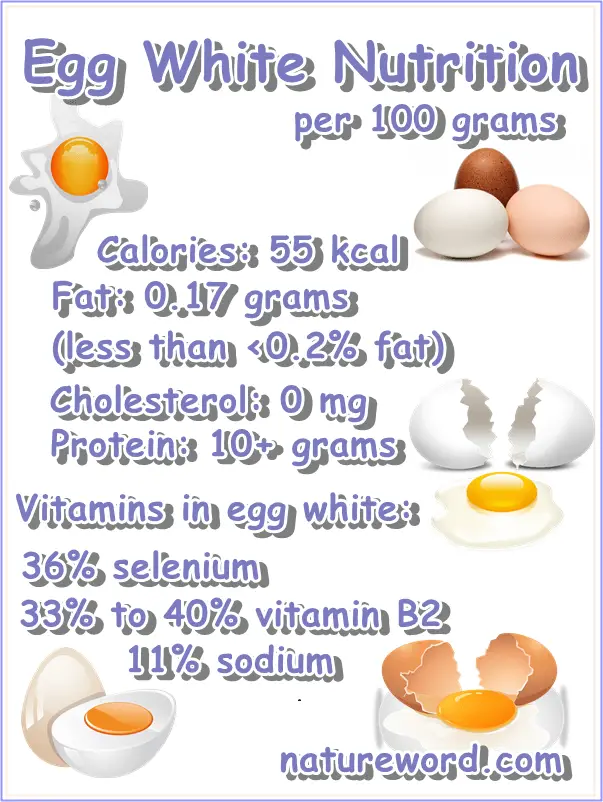How many calories in egg white? How much fat in egg white? How much protein in egg white? What about vitamins and minerals? Egg white is dubbed the healthier part of the egg because it’s high protein, low in calories, very low in carbs, cholesterol free and almost fat free. The difference between egg white and egg yolk nutrition is quite substantial, with egg whites having overall less nutritional value compared to yolks. Even so, egg white is preferred to egg yolk and whole eggs because of its nutrition.
Egg white calories
How many calories in egg white? There are 55 calories, also called kilocalories, in 100 grams of egg white which is the equivalent of about 3 egg whites from 3 medium or large chicken eggs (egg size values differ from country to country). Egg white is naturally very low in calories because it has almost no fat, carbs or sugar. Instead, the egg yolk is rich in calories, fat, and protein.
Find out more about egg yolk nutrition.

Egg white protein content and quality
You definitely want to eat egg white for protein and there are several advantages if you do. For one, egg white is high in protein with a protein content of over 10 to 11 grams per 100 grams of egg white. Secondly, egg white contains quality protein, dubbed complete protein. What this means is that the protein in egg white is made up of all nine essential amino acids that the human body needs everyday.
Also, egg white is close to 90% water and around 10% protein, with virtually no fat, no cholesterol and almost no carbs or sugar which is what makes this part of the egg healthier, and good to eat everyday, or at least more often. But there’s a catch. Egg white nutrition is very low in vitamins and low to very low in most minerals.
Is there more protein in egg white or egg yolk?
There is actually more protein in egg yolk than egg white. A serving of 100 grams of egg yolk provides 15 to 16 grams of protein, while the same amount of egg white provides 10 to 11 grams of protein. But egg whites represent the bigger part of the egg. In chicken eggs, which is what most people eat most often, the egg white is about two thirds (2/3) of the whole egg, while the yolk is about one third (1/3). This means that egg whites do provide more protein than yolks.
Egg white fat content and profile
How much fat in egg white? There are about 0.17 grams of fat in 100 grams of egg white, which makes egg white under 0.2% fat. More exactly, about 3 egg whites from chicken eggs provide less than 0.2 grams of fat. Almost all of the fat content in eggs is housed in the egg yolk.
Egg white cholesterol content
How much cholesterol in egg white? Egg white is naturally cholesterol free which is just one of the many benefits of eating egg whites. By comparison, there are 1085 milligrams of cholesterol in 100 grams of egg yolk. But there are just as many benefits of egg yolks that can be attributed to cholesterol itself, including vitamin D synthesis and metabolism for better immunity and improved fertility, hormone production and insulation of nerve cells which is vital for nervous system health.
Egg white carbohydrate content
How many carbs in egg white? There are on average 0.73 grams of carbs in 100 grams of egg whites, 0.71 grams of which are sugars. Just one egg white at an estimated weight of 33 grams has only 0.24 grams of carbs, 0.23 grams of which are sugars. Given their carbohydrate content, egg whites are a good keto food.

Egg white vitamins
Vitamin A
There is no vitamin A in egg whites vs egg yolks which provide 42.3% of daily vitamin A requirements per 100 grams and 7.2% of daily vitamin A requirements per yolk.
Vitamin B1 (thiamin)
There are 0.004 milligrams (mg) of vitamin B1 in 100 grams (g) of egg white, and 0.001 mg of vitamin B1 per egg white at an estimated weight of 33 g. The average adult needs 1.2 mg of vitamin B1 everyday. 100 g of egg white provides only 0.33% of daily vitamin B1 requirements.
Vitamin B2 (riboflavin)
There are 0.439 mg of vitamin B2 per 100 g of egg white, and 0.145 mg of vitamin B2 per egg white. The recommended daily intake is 1.1 mg of vitamin B2 for women, and 1.3 mg for men. A serving of 100 grams of egg white provides 40% of daily vitamin B2 for women, and over 33% for men. One egg white at 33 grams provides 13% of daily vitamin B2 for women and 11% for men.
Vitamin B3 (niacin)
There are 0.105 mg of vitamin B3 in 100 grams of egg white, and 0.035 mg of vitamin B3 per egg white. The recommended daily intake is 14 mg of vitamin B3 for women, and 16 mg for men. A serving of 100 grams of egg white provides trace amounts of vitamin B3 (under 1%).
Vitamin B5 (pantothenic acid)
There are 0.19 mg of vitamin B5 in 100 grams of egg white, and 0.063 mg of vitamin B5 per egg white. The recommended daily intake of vitamin B5 is 5 mg. A serving of 100 grams of egg white provides trace amounts of vitamin B5 (3.8%).
Vitamin B6 (pyridoxine)
There are 0.005 mg of vitamin B6 in 100 grams of egg white, and 0.002 mg of vitamin B6 per egg white. The recommended daily intake of vitamin B6 is 1.7 mg. 100 grams of egg white provides trace amounts of vitamin B6 (under 0.5%).
Vitamin B9 (folate)
There are only 4 mcg (micrograms) of vitamin B9 in 100 grams of egg white. The recommended daily intake of vitamin B9 is 400 mcg which means a serving of 100 grams of egg white provides only 1% of daily vitamin B9 requirements.
Choline
There are only 1.1 mg go choline in 100 grams of egg white, and 0.363 mg per egg white. The recommended daily intake of choline is 550 mg for men and 425 mg for women. 100 grams of egg white provides only trace amounts of the nutrient.
Vitamin B12
There are only 0.09 mcg (micrograms) of vitamin B12 in 100 grams of egg white, and 0.03 mcg per egg white. The recommended daily intake of vitamin B12 is 2.4 mcg which means a serving of 100 grams of egg white provides only trace amounts of the vitamin (3.75%).
Vitamin C
How much vitamin C in egg white? There is no vitamin C in egg whites.
Vitamin D
How much vitamin D in egg white? There is no vitamin D in egg whites.
Vitamin E
How much vitamin E in egg white? There is no vitamin E in egg whites.
Vitamin K
How much vitamin K in egg white? There is no vitamin K in egg whites.
Egg white minerals
Calcium
There are 7 mg (milligrams) of calcium per 100 g of egg white, and 2.31 mg per one egg white. The average adult needs 1300 mg (milligrams) of calcium every day, and a serving of 100 grams of egg white provides only 0.5% of daily calcium requirements.
Copper
There are 0.023 mg of copper per 100 g of egg white, and 0.008 mg per one egg white. The average adult needs 0.9 mg of copper every day, and a serving of 100 grams of egg white provides only 2.5% of daily copper requirements.
Iron
There are 0.08 mg of iron per 100 g of egg white, and 0.0026 mg per one egg white. The average adult needs 18 mg of iron every day, and a serving of 100 grams of egg white provides only 0.4% of daily iron requirements.
Magnesium
There are 11 mg of magnesium per 100 g of egg white, and 3.63 mg per one egg white. The average adult needs 400 mg of magnesium every day, and a serving of 100 grams of egg white provides only 2.75% of daily magnesium requirements.
Manganese
There are 0.011 mg of manganese per 100 g of egg white, and 0.004 mg per one egg white. The average adult needs between 1.8 mg and 2.3 mg of manganese every day (women and men), and a serving of 100 grams of egg white provides only 0.6% of daily manganese for women and 0.47% for men.
Phosphorus
There are 15 mg of phosphorus per 100 g of egg white, and 4.95 mg per one egg white. The average adult needs 700 mg of phosphorus every day, and a serving of 100 grams of egg white provides only 2.1% of daily requirements.
Potassium
There are 163 mg of potassium per 100 g of egg white, and 53.8 mg per one egg white. The average adult needs 4700 mg of potassium every day, and a serving of 100 grams of egg white provides only 3.46% of daily requirements.
Selenium
There are 20 mcg (micrograms) of selenium per 100 g of egg white, and 6.6 mcg per one egg white. The average adult needs 55 mcg of iron every day, and a serving of 100 grams of egg white provides over 36% of daily selenium requirements.
Sodium
There are 166 mg of sodium per 100 g of egg white, and 54.8 mg per one egg white. The average adult needs 1500 mg of iron every day, and can have up to 2300 mg. 100 grams of egg white provides only 11% of daily sodium requirements.
Zinc
There are 0.03 mg of zinc per 100 g of egg white, and 0.01 mg per one egg white. The average adult needs a minimum of 11 mg of zinc every day and a serving of 100 grams of egg white provides 0.27% of daily zinc.
Note: The nutritional values presented apply to chicken eggs, unless otherwise specified.
